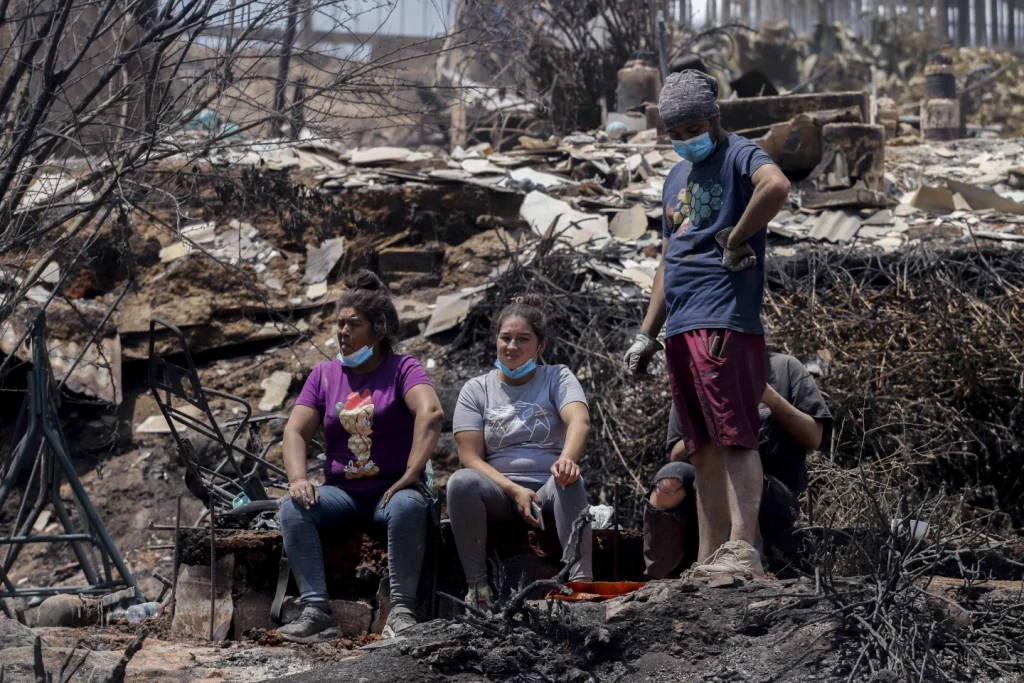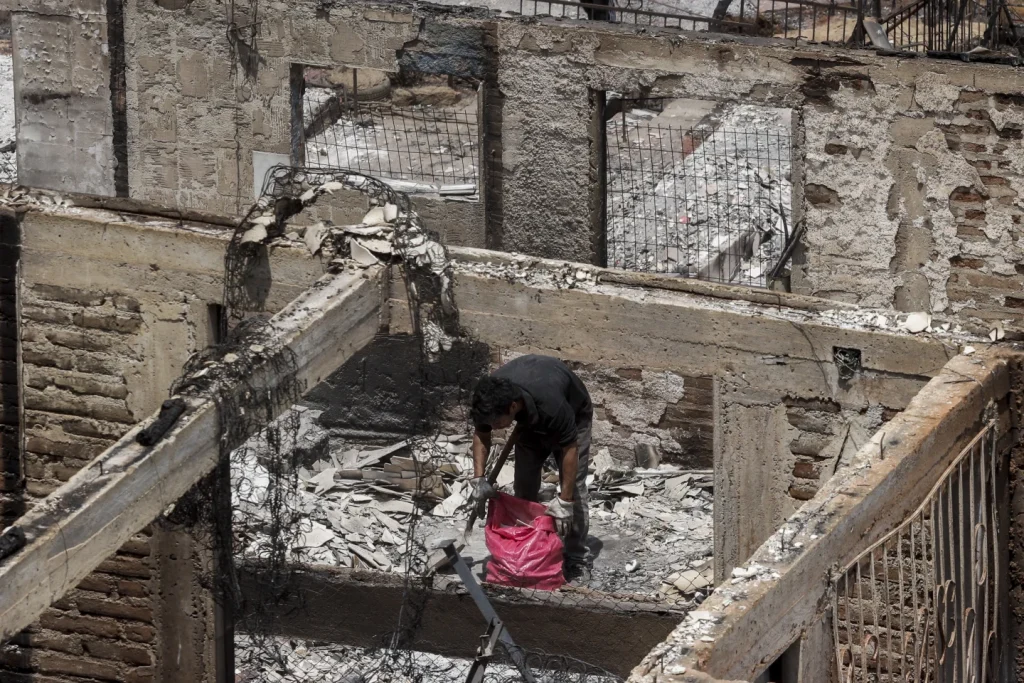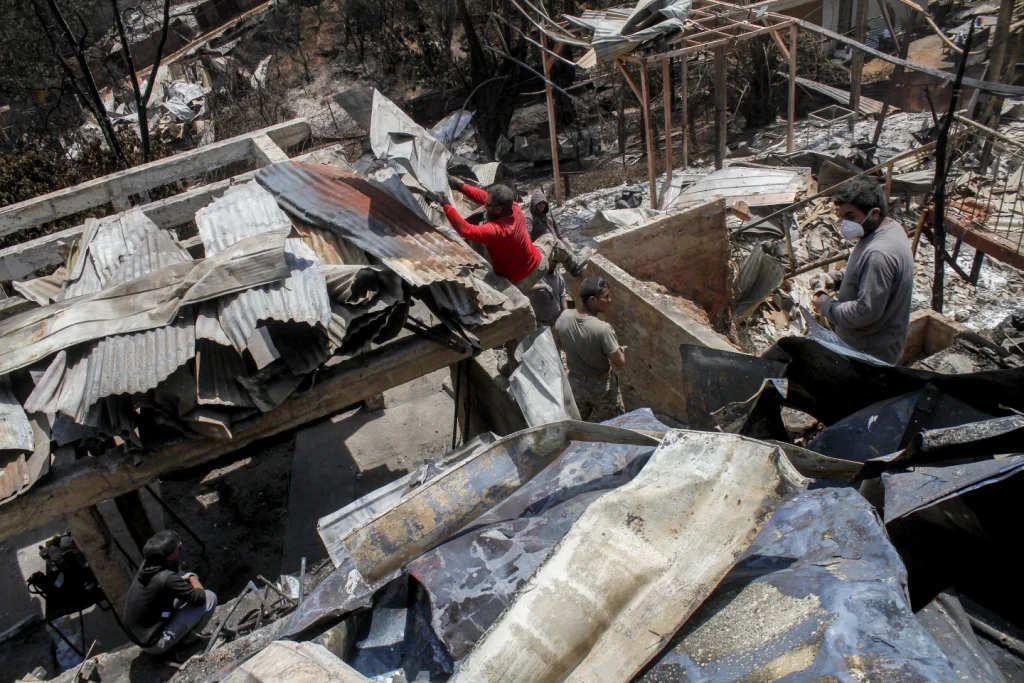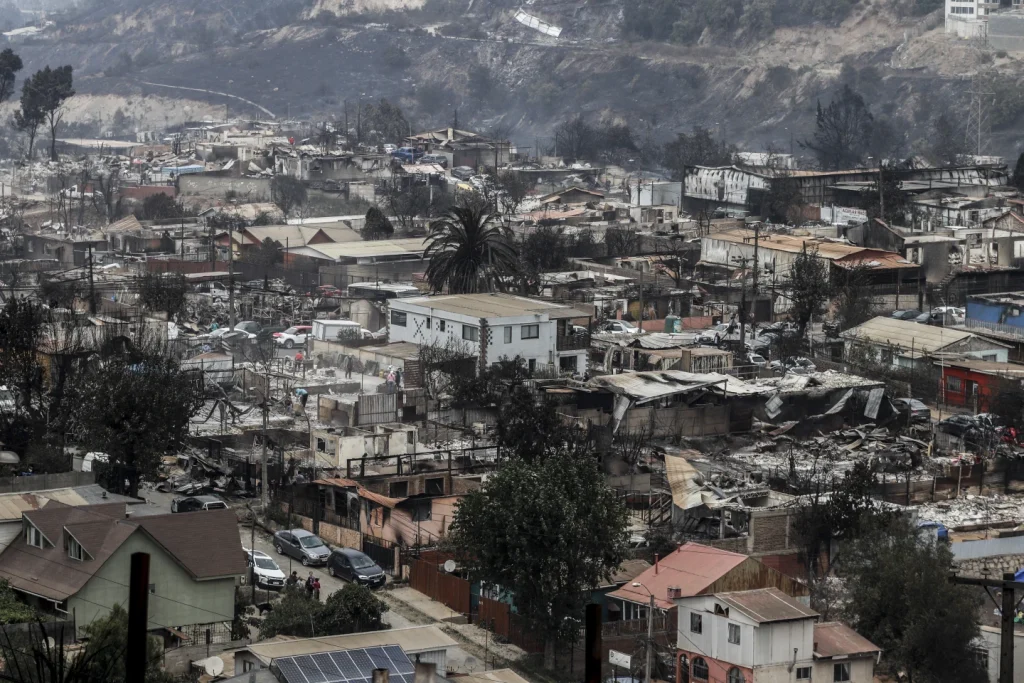The recent outbreak of massive forest fires in central Chile has plunged the region into a state of turmoil and devastation.
The fires, which erupted two days ago, have wreaked havoc on the landscape, claiming lives, destroying homes, and leaving a trail of destruction in their wake.
As firefighters battle tirelessly to contain the infernos, the toll of this disaster continues to mount, with at least 112 individuals reported dead and numerous others missing or injured.
The city of Viña del Mar, renowned for its picturesque surroundings and vibrant community, has found itself at the epicenter of this catastrophe.
The fires, raging with unprecedented ferocity, have laid waste to vast swathes of land, including a cherished botanical garden established in 1931.
The loss of this cultural and ecological treasure is a poignant symbol of the irrevocable damage inflicted by the flames.
Moreover, the displacement of 1,600 individuals from their homes underscores the human tragedy that has unfolded in the wake of the fires.
Tragically, the devastation extends beyond Viña del Mar, with neighboring towns and cities also bearing the brunt of the infernos.

The town of Quilpé, another heavily impacted area, has reported a staggering death toll of 64, further underscoring the magnitude of the crisis. A
s President Gabriel Boric visited the affected regions, the grim reality of the situation became all too apparent.
With the confirmed death toll standing at 112 and the possibility of further casualties looming, the gravity of the disaster cannot be overstated.
Amidst the chaos and destruction, questions have arisen regarding the origins of the fires. Speculation has emerged that some of the blazes may have been deliberately ignited, raising concerns about potential acts of arson.
The simultaneous ignition of fires in four distinct locations has led officials to consider the possibility of foul play, prompting calls for a thorough investigation to identify those responsible.
The deliberate nature of these fires, if proven, would only compound the tragedy and demand swift and decisive action to bring the perpetrators to justice.
The challenges faced by firefighters and emergency responders in combating the fires are compounded by the difficult terrain and the rapid spread of the flames.
Despite concerted efforts to contain the infernos, the fires have encroached upon densely populated areas, posing a grave threat to residents and exacerbating the difficulties of containment.
The resilience and determination of the firefighting teams are commendable, yet the scale of the disaster presents an immense challenge that demands a unified and resolute response.
As Chile grapples with this unprecedented crisis, the nation mourns the loss of life and the devastation wrought by the fires.
The impact on communities, the environment, and the collective psyche of the nation is profound, underscoring the urgency of concerted action to address the immediate aftermath of the disaster and to implement measures to prevent such tragedies in the future.
On Saturday, President Boric expressed concern over the challenging conditions exacerbating the wildfires in central Chile, attributing the difficulty in containment to the combination of abnormally high temperatures, low humidity, and strong winds.
The extent of the devastation is evident in the 8,000 hectares (30 square miles) of forest and urban areas already consumed by the fires.

In an effort to assess the situation firsthand, President Boric conducted an aerial survey of the affected areas on Sunday and visited a school repurposed as a shelter for the displaced.
Additionally, he announced the temporary conversion of a presidential vacation home in Viña del Mar into a recreational facility for the children of families impacted by the fires.
The gravity of the situation was further underscored by the declaration of two days of national mourning. In his address, President Boric emphasized the collective suffering experienced by the nation, while also expressing resilience and determination, stating, “All of Chile is suffering, but we will stand up once again.”
As a precautionary measure, officials urged residents in the affected areas to evacuate promptly, while those further from the fires were advised to remain at home to facilitate the movement of emergency vehicles.
In response to the escalating threat of looting, curfews have been implemented in Viña del Mar, as well as the nearby cities of Quilpé and Villa Alemana.
This measure is being taken as part of a concerted effort to safeguard the local communities and prevent any potential criminal activity.
The urgency of the situation is further compounded by the recent outbreak of fires, which have ravaged the region amidst a period of unprecedented high temperatures.
This alarming trend is a direct result of the El Niño weather pattern, which has caused widespread droughts and soaring temperatures across western South America.
The combination of these factors has significantly heightened the risk of forest fires, posing a serious threat to the safety and well-being of the local population.
As such, the implementation of curfews represents a necessary step in ensuring the protection of the community and the prevention of further harm.
It is imperative that all residents adhere to these measures in order to mitigate the potential risks and ensure the safety of all individuals in the affected areas.
In conclusion, the forest fires that have ravaged central Chile represent a catastrophic event of unparalleled magnitude.
The loss of life, the destruction of homes and natural habitats, and the trauma inflicted upon communities demand a comprehensive and compassionate response.

As the nation mourns and grapples with the aftermath, the resilience and solidarity of the people of Chile will be crucial in navigating the long road to recovery.
The fires serve as a stark reminder of the fragility of our natural environment and the imperative to prioritize measures that safeguard against such calamities.
The road to healing and restoration will be arduous, but with unity, determination, and international support, Chile will emerge from this tragedy with renewed strength and resilience.
